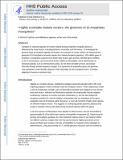Highly evolvable malaria vectors: The genomes of 16 Anopheles mosquitoes
Author(s)
Waterhouse, Robert; Chan, Clara Sophia; Jungreis, Irwin; Novoa Pardo, Eva Maria; Wu, Yi-Chieh; Kellis, Manolis; ... Show more Show less
DownloadKellis_Highly evolvable.pdf (1.593Mb)
PUBLISHER_POLICY
Publisher Policy
Article is made available in accordance with the publisher's policy and may be subject to US copyright law. Please refer to the publisher's site for terms of use.
Terms of use
Metadata
Show full item recordAbstract
Variation in vectorial capacity for human malaria among Anopheles mosquito species is determined by many factors, including behavior, immunity, and life history. To investigate the genomic basis of vectorial capacity and explore new avenues for vector control, we sequenced the genomes of 16 anopheline mosquito species from diverse locations spanning ~100 million years of evolution. Comparative analyses show faster rates of gene gain and loss, elevated gene shuffling on the X chromosome, and more intron losses, relative to Drosophila. Some determinants of vectorial capacity, such as chemosensory genes, do not show elevated turnover but instead diversify through protein-sequence changes. This dynamism of anopheline genes and genomes may contribute to their flexible capacity to take advantage of new ecological niches, including adapting to humans as primary hosts.
Date issued
2014-11Department
Massachusetts Institute of Technology. Computer Science and Artificial Intelligence Laboratory; Massachusetts Institute of Technology. Department of Electrical Engineering and Computer ScienceJournal
Science
Publisher
American Association for the Advancement of Science (AAAS)
Citation
Neafsey, D. E., R. M. Waterhouse, M. R. Abai, S. S. Aganezov, M. A. Alekseyev, J. E. Allen, J. Amon, et al. “Highly Evolvable Malaria Vectors: The Genomes of 16 Anopheles Mosquitoes.” Science 347, no. 6217 (November 27, 2014): 1258522–1258522.
Version: Author's final manuscript
ISSN
0036-8075
1095-9203